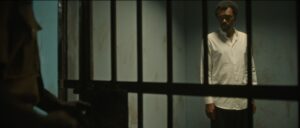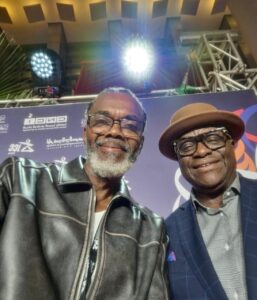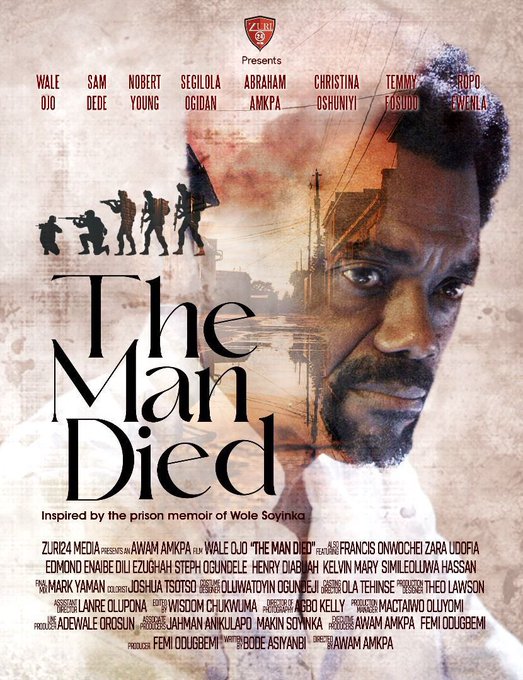- Safiu Kehinde
The movie adaptation of Wole Soyinka’s memoir, The Man Died, has won the best screenplay award at the 35th Carthage International Film Festival held in Tunis, Tunisia.
This was announced in a statement issued and made available to NPO Reports on Monday.
Prior to the award at the Carthage Film Festival which was held between 14th to 21st of November, the movie had earlier won Best Screenplay at the African International Film Festival (AFRIFF) and Best Audience Choice Award at the Eastern Nigeria International Film Festival (ENIFF).
The Man Died, written by United Kingdom-based Bode Asiyanbi, was again unveiled as a winner in the feature film competition alongside 14 other entries from diverse countries at the closing ceremony of the Carthage festival held at the Opera Theatre in the Tunis city of culture.

Entries for the various competitive categories were received from about 100 countries, according to the festival’s website.
The Grand Prize, called the Golden Tanit, was however won by Tunisian Lotfi Achour’s feature film “The Red Path” (Les Enfants Rouges).
The silver trophy went to ‘To an Unknown World’ by Palestinian director Mahdi Fleifel, while the bronze trophy went to ‘Demba’ by Senegalese director Mamadou Dia.
In attendance to claim the award for The Man Died movie were the director, Awam Amkpa and the lead actor, Wale Ojo, who portrayed Wole Soyinka.
Though yet to be officially released to the market, a “special-premiere” was held in July in Lagos to mark the Nobel laureate dramatist, poet, essayist and human/civil rights activist, Soyinka’s 90th birthday.
The movie produced by Lagos, Nigeria-based Femi Odugbemi for Zuri24 Media, is now, according to the statement, set to feature at yet another prestigious African film festival, Luxor International Film Festival in Egypt, January 9-16.

It will thereafter go to Jo’Burg Film Festival, SA (February); African Film Festival, New York, US (March), and FESPACO in Burkina Faso (March), among others.
The Man Died has also being considered for special screenings at educational institutions in Florence, Italy; Abu Dhabi in the UAE; Jo’Burg, South Africa as well at Harvard University, Oxford University, and at Ithaca College, all in the USA, among others.
This is as it is also being reviewed by at least three major global streaming platforms, and international distribution channels.
The casts spearheaded by Wale Ojo as Wole, also starred other renowned Nigerian thespians including Sam Dede as Yisa, Norbert Young (Prison Superintendent), Francis Onwochei(Prison Controller and Edmund Enaibe as Commissioner; and international actors, London-UK-based Christiana Oshunniyi (Laide Soyinka), and Los Angeles, USA-based Abraham Awam-Amkpa (Johnson), among others.
The film began its global tour in London in July as part of the Wole Soyinka at 90 celebration jointly organized and hosted by the Africa Centre and the Wole Soyinka International Cultural Exchange, WSICE.
It returned to same London in October as part of the African Film Festival, and also had an educational screening at the University of East Anglia, Norwich. It was screened on October 11 on the ‘Accra Streamfest’ bill of the “Labone Dialogues”, hosted by New York University, NYU Accra.
The film has also had a series of home runs including on October 5 at the Quramo Festival of Words, QFest 2024, Lagos; and the Lagos Book & Art Festival, LABAF on November 14.
Produced by Zuri 24 Media, The Man Died, according to the synopsis on its website — www.themandiedmovie.com — is the story of Wole Soyinka’s 27 months incarceration by the Nigerian government in 1967 at the cusp of the civil war.
He was famously seeking a truce between Biafra and the Federal Government to allow time for a negotiated settlement of the conflict. It is fundamentally a personal account.
Essentially, the subject found refuge from the brutality inflicted upon him by retreating into and living within his own mind. At times, he drifted about the frontiers of madness, hanging on to himself by a thread. At other times, he pondered, listened, and watched, like only the truly otherwise unoccupied can. Importantly, he managed to scrounge paper and a pencil from time to time and record his journey of ‘motionlessness.”


